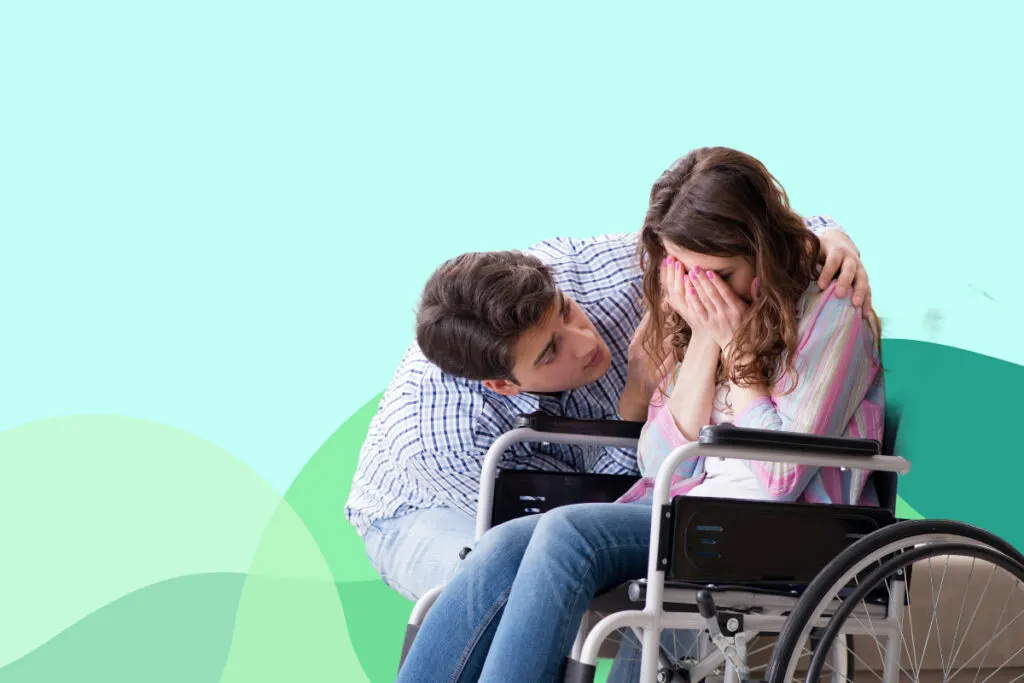TABLE OF CONTENTS
What is family stress
Family stress is anything that disturbs, upsets, or puts pressure on the family system, creating a demand-resources imbalance. It can be as mild as spilling milk on the kitchen floor or as severe as having a house burned down.
Stress does not always cause damage. It can affect a family’s equilibrium in positive or negative ways.
Some families can bend under pressure and grow stronger, but some do not survive stressful situations.

Types of family stress
There are two main types of stress that affect families- positive stress and negative stress.
Positive stress is eustress, such as getting married. Eustress leads to positive feelings and a healthy body. A positive stressful experience can bring families closer, strengthen them, build shared experiences, and help them overcome new challenges. Planning a birthday party or preparing for a competition are some examples of positive stressors.
Negative stress is distress, such as family discord. Distress is associated with negative emotions and impairments. They can challenge a family’s resilience, causing difficult emotional states and reactions within the family unit. Having a conflict or facing a rejection are examples of negative stressors.
A family stressor can be categorized into the following types.
- internal (e.g., divorce) or external (e.g., war)
- normative (e.g., enrolling in a new school) or catastrophic (e.g., natural disaster)
- predictable (e.g., getting bad grades) or unexpected (e.g., sudden death of a family member)
- ambiguous (e.g., child acting out for unclear reasons) or clear (e.g., unemployment)
- chronic (e.g., busy schedules) or acute (e.g., car accident)
- cumulative (e.g., parent constantly yelling at kids) or isolated (e.g., parent yelling in a dangertous situation)

Family Stress Examples
Here are some of the positive and negative examples of stressors.
Eustress – Positive stress examples
- Starting a new job or business
- Moving to a new house or city
- Planning a wedding or other special event
- Welcoming a new baby to the family
- Planning a family vacation
- Organizing gatherings for holidays and traditions
- Starting a new hobby or activity as a family
- Celebrating a milestone or achievement, such as a graduation or anniversary.
- Renovating the family house
- Supporting a family member through a major accomplishment, such as a sports tournament
Distress – Negative stress examples
- Divorce or separation of parents
- Injury or chronic illness of a family member
- Death of a family member or close friend
- Financial difficulties or job loss
- Domestic violence or abuse
- Substance abuse or addiction within the family
- Academic or behavioral problems with a child
- Legal problems or incarceration of a family member
- Infidelity or betrayal within the family
- Mental health challenges or diagnoses within the family
- Cultural or generational conflicts within the family
- Homelessness or housing instability
- Blended family challenges or adjustment difficulties
- Unemployment of a parent
- Immigration or cultural adaptation challenges
- Caregiving responsibilities for an aging or ill family member
- Natural disasters that impact the family or community
- War
- Recession
- Family estrangement
- Parental burnout

How stress affects a family
Stress impacts parents’ mental well-being
Most family stresses influence parents directly more than children, leading to psychological distress in parents.
For example, economic hardship, particularly for mothers living in rural poverty, is strongly associated with symptoms of depression, hostility, anxiety, and other mental distress.1
Parental stress disrupts family dynamics
Psychological distress in parents can disrupt both parenting practices and relationships between spouses.
Such distress may lead to insensitive parenting, decreased family time, overcontrolling behavior, and harsh discipline. Consequently, these families are at higher risk for child abuse and neglect.
Additionally, parental mental distress can lead to marital conflicts and less spousal support, reducing relationship satisfaction.2
Children’s adjustment suffers due to disrupted parenting
Distressed parents may engage in inconsistent or harsh discipline practices, monitor their children less frequently, or withdraw emotional support.
Effects of stress may manifest in child adjustment issues, including temper tantrums, externalizing behavior, conduct disorders, poor academic performance, and internalizing symptoms.
Risk factors vs. protective factors
Every family is unique, and their reactions to stress vary significantly, as different sources of stress can manifest in different ways.
But psychologists have found that how a family responds to a stressor event is often influenced by existing resources, their beliefs, and the family’s ability to deal with problems. These factors play a pivotal role in determining whether a family struggles with (risk factors) or recovers from stress (protective factors).
Risk factors may escalate stress into a crisis, making it harder for the family to cope. On the other hand, protective factors can prevent this escalation, enhancing a family’s resilience during stressful times.
The following are examples of risk and protective factors that can exacerbate or alleviate familial stress.3
| Risk factors examples | Protective factors examples | |
| Family’s resources | – poor individual skills – distant family relationships – inflexible thinking – lack of additional resources | – good problem-solving skills – close family relationships – flexible thinking – additional resources, like family therapy and professional help |
| Coping strategies | – go into panic mode – emotional suppression or invalidation – no emotional support | – take deep breaths – emotional validation – emotionally support each other |
| Appraisal | – negative interpretations – view the situation as an obstacle or failure – fixed mindset | – positive meaning-making – redefine the situation as a challenge – growth mindset |
| Balance | – rigid rules – demand uniform beliefs and values | – a balance between rules and independence – accept differences in beliefs and values |
| Degrees of stress | – multiple family stressors piling up | – less stress happening at the same time |
| Moving on | – get “stuck” in crisis mode | – move on from a difficult family situation |

How to deal with family stress
Here are some coping strategies for family problems that can help overcome family stress and mitigate its negative effects.
Make changes
Engaging in active problem-solving and taking the initiative to change a situation is associated with stress relief4.
For instance, parents can seek help from various sources, including their extended family, friends, neighbors, or family therapist. They can also analyze the root cause of the problem and devise strategies to change or prevent its occurrence.
Support each other
Turn stressful family experiences into a family bonding opportunity. Strengthen relationships by attending to the emotional connection between family members.
A family under stress can benefit significantly from mutual support and understanding.
Have a family meeting to discuss the issue and validate each other’s feelings. You can support each other without necessarily endorsing all of their views. Showing empathy, providing a listening ear, or giving a hug can help ease stress.
Being flexible in rules and accepting others despite having different opinions improves family resilience when facing challenges.5
By approaching stress as a team and working together towards a common goal, families can weather the storms of stress and may come out even stronger on the other side10.
Parents can seek social support from their circle of friends, extended family, neighbors, and the local community.
During difficult times, this support system becomes one of the most valuable resources, helping a struggling family to overcome major crises and restore stability.
Leveraging social support is associated with less significant stress, more effective parenting practices, and positive child outcomes6. Utilizing these relationships can create a healthy environment fostering parents’ and children’s resilience and well-being.
Adjust mindset
When faced with stress, finding ways to adjust to the situation mentally can help relieve the pressure.
Some ways to do this include changing expectations to be more realistic, accepting what can’t be changed, or finding something positive even in difficult times.7
Thinking positively and trying to see stressful events in a new light can lead to better mental well-being and reduce stress.
On the other hand, avoiding the topic, pretending it doesn’t exist, or wishing it would go away might feel easier in the short term but these approaches can cause more problems in the long run.8
Self-care for the whole family
Taking care of both mental and physical health is essential for coping with stress. Good coping skills include practices that promote overall well-being, such as getting enough sleep and engaging in regular exercise.
Incorporating a healthy living approach into family life makes it easier to handle stress and build resilience.9
Family activities that promote this lifestyle can be both fun and beneficial. Examples include walking, jogging, riding bikes together, meditating, playing sports or board games, or participating in exercise classes or fitness challenges. These activities offer the family a chance to connect and take refreshing breaks from stressful times, contributing to a more balanced and harmonious life.
References
- 1.Newland RP, Crnic KA, Cox MJ, Mills-Koonce WR. The family model stress and maternal psychological symptoms: Mediated pathways from economic hardship to parenting. Journal of Family Psychology. Published online 2013:96-105. doi:10.1037/a0031112
- 2.Warren EJ, Font SA. Housing Insecurity, Maternal Stress, and Child Maltreatment: An Application of the Family Stress Model. Social Service Review. Published online March 2015:9-39. doi:10.1086/680043
- 3.McCubbin HI, Patterson JM. The Family Stress Process. Marriage & Family Review. Published online April 27, 1983:7-37. doi:10.1300/j002v06n01_02
- 4.Hall NC, Chipperfield JG, Perry RP, Ruthig JC, Goetz T. Primary and secondary control in academic development: gender-specific implications for stress and health in college students1. Anxiety, Stress & Coping. Published online June 2006:189-210. doi:10.1080/10615800600581168
- 5.Daks JS, Peltz JS, Rogge RD. Psychological flexibility and inflexibility as sources of resiliency and risk during a pandemic: Modeling the cascade of COVID-19 stress on family systems with a contextual behavioral science lens. Journal of Contextual Behavioral Science. Published online October 2020:16-27. doi:10.1016/j.jcbs.2020.08.003
- 6.McConnell D, Breitkreuz R, Savage A. From financial hardship to child difficulties: main and moderating effects of perceived social support. Child: Care, Health and Development. Published online December 9, 2010:679-691. doi:10.1111/j.1365-2214.2010.01185.x
- 7.Hall NC, Perry RP, Chipperfield JG, Clifton RA, Haynes TL. Enhancing Primary and Secondary Control in Achievement Settings Through Writing–Based Attributional Retraining. Journal of Social and Clinical Psychology. Published online April 2006:361-391. doi:10.1521/jscp.2006.25.4.361
- 8.Santiago CD, Etter EM, Wadsworth ME, Raviv T. Predictors of responses to stress among families coping with poverty-related stress. Anxiety, Stress & Coping. Published online May 2012:239-258. doi:10.1080/10615806.2011.583347
- 9.Rone-Adams SA, Stern DF, Walker V. Stress and Compliance with a Home Exercise Program Among Caregivers of Children with Disabilities. Pediatric Physical Therapy. Published online 2004:140-148. doi:10.1097/01.pep.0000136006.13449.dc
- 10.Leske JS. Comparison of Family Stresses, Strengths, and Outcomes After Trauma and Surgery. AACN Clinical Issues: Advanced Practice in Acute and Critical Care. Published online February 2003:33-41. doi:10.1097/00044067-200302000-00005
